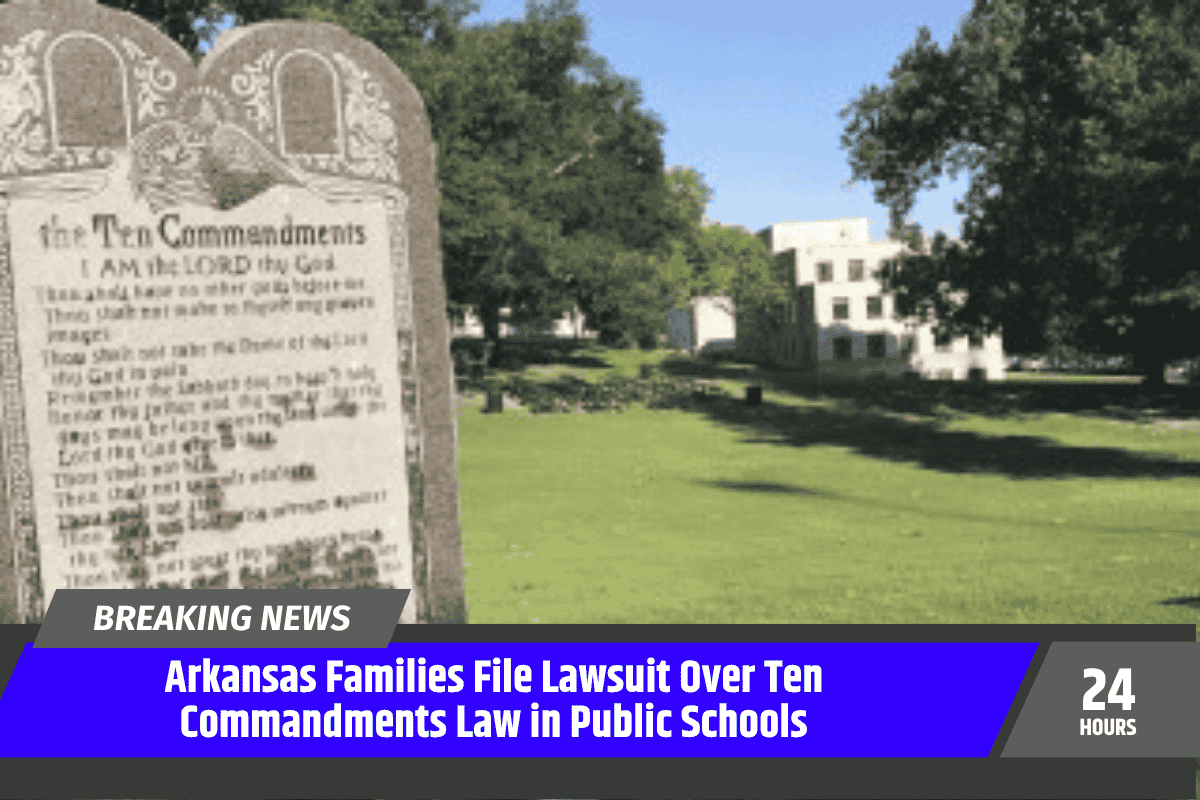Seven families from Arkansas have filed a lawsuit to challenge a new state law that mandates the display of the Ten Commandments in every public school classroom and library.
The families argue that this law violates their constitutional rights and will create a religiously coercive environment for their children.
Background of the Law and Lawsuit
The Arkansas law, which takes effect in August, was signed by Republican Governor Sarah Huckabee Sanders in April.
It requires that the Ten Commandments be prominently displayed in every classroom and library across the state.
The lawsuit, filed on June 11 in the U.S. District Court for the Western District of Arkansas, is being represented by a multifaith group of families.
These families, who belong to different religious backgrounds such as Jewish, Unitarian Universalist, and non-religious faiths, have partnered with the American Civil Liberties Union (ACLU), Americans United for Separation of Church and State (AU), and the Freedom From Religion Foundation (FFRF) to take action against the law.
The plaintiffs claim that the law infringes on their rights under the U.S. Constitution’s First Amendment, which protects freedom of religion and the separation of church and state.
The families are asking a federal judge to declare the law unconstitutional. They also plan to file a motion for a preliminary injunction to block the law while the case is being decided.
The Legal Arguments
The families argue that the law forces their children to engage with a specific Christian religious text, which goes against their beliefs and violates their rights as parents to guide their children’s religious education.
Samantha Stinson, one of the plaintiffs, expressed concern that this law would make schools feel unwelcoming and religiously coercive for children who do not share the same faith.
The lawsuit further argues that by requiring the display of the Ten Commandments in every classroom, the law sends a harmful message to students who do not adhere to the Christian faith.
It pressures these students to feel excluded and not express their own religious beliefs.
The law also mandates that the Ten Commandments be posted in a “conspicuous place,” measuring at least 16 inches wide and 20 inches tall, and be printed in a legible typeface.
Additionally, the lawsuit points out that the version of the Ten Commandments mandated by the law is based on a Protestant interpretation. This version conflicts with the version followed by many Jews and Catholics, further raising concerns of religious favoritism.
Nationwide Trend and Opposition
The Arkansas case is part of a broader trend in Republican-led states pushing for religious displays and teachings in public schools. Similar laws have been proposed in other states like Louisiana and Texas.
In Louisiana, a law requiring the display of the Ten Commandments in public classrooms was blocked by a federal judge, who declared it unconstitutional. The case is still under appeal.
In Texas, lawmakers have also passed a bill requiring the Ten Commandments to be displayed in classrooms, and Governor Greg Abbott is expected to sign it into law.
Oklahoma’s top education official has ordered public schools to teach the Bible, though many districts have resisted these directives.
Opponents of these laws, including civil rights advocates, argue that these actions violate students’ constitutional rights by imposing religious beliefs in public schools.
Rachel Laser, the president of Americans United for Separation of Church and State, condemned the Arkansas law as part of a “Christian Nationalist” agenda.
She emphasized that it undermines the country’s promise of religious freedom and forces one set of religious views on all students, including those who do not follow that religion.
The outcome of this lawsuit could set an important precedent for the relationship between religion and public education in the United States.
If the court rules in favor of the plaintiffs, it could impact similar laws across the country, reinforcing the principle of separation of church and state.
As the case progresses, it will likely attract more attention and spark further debates about the role of religion in public life.












